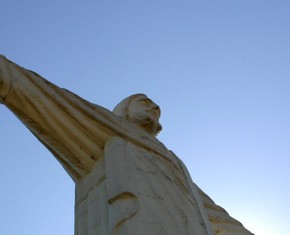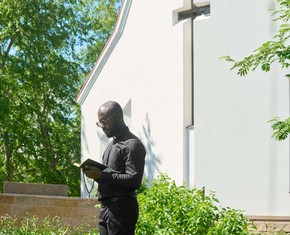The views expressed in our content reflect individual perspectives and do not represent the authoritative views of the Baha'i Faith.
Have you ever wondered why God allows suffering? Theodicy – faith in the face of suffering and evil comes to mind when we consider slavery.

Voltaire
Voltaire (1694-1778) – one of the most influential enlightenment philosophers – tackles the question of theodicy head on in his very popular bildungsroman, Candide. Published in 1759 Voltaire’s coming of age satire assails the popular conviction that God made the world “the best of all possible worlds”. The novel’s protagonist Candide suffers exile. Evicted from paradise the youth experiences first-hand the ravages of human depravity manifest in kidnapping, torture and slavery as well as the irrational carnage of historical catastrophes like the 1755 Lisbon earthquake. As Candide travails from one horror to the next we experience his disillusion with the Optimism that “all is for the best”. Candide’s suffering supplants his youthful faith and innocence with a practical conviction that, il faut cultiver notre jardin. “We must cultivate our garden” asserts that the best we can do is take care of our own as we have no way to know God’s ways or will.
This conclusion exalts individual self-reliance over faith in a divine rationale governing human affairs. The literal interpretation of Voltaire’s adage is the animating essence of the enlightenment ideal – a fair land where each had a right to a parcel of prosperity. To an extent unmatched anywhere else in the world America evolved to represent the embodiment of this enlightened aspiration – save for the presence in its midst of chattel slavery and racism.
The persistence of the abominable scourge reiterates this challenge to the faithful – when will God “bind the broken and crush the oppressor”? This article addresses the question by exploring Eve and the Wedding Banquet parable to appreciate that for the love of Eve; God actively intercedes to advance His will.
In Genesis we find Adam abiding in Eden’s paradise ignorant; needing a guide by which to make sense of the world. Therefore, God made Eve.
But for Adam no suitable helper was found. So, the Lord God caused the man to fall into a deep sleep; and while he was sleeping; he took one of the man’s ribs… Then the Lord God made a woman from the rib. Genesis 2:7; 2:20-22
Eve consumes the fruit of the tree of knowledge – there is no apple – enabling humanity to perceive the truth and direct its free will accordingly. Eve is a metaphor for the emergence of the conscious heart. The allegory illustrates the foundational turning point in human evolution. The moment humanity receives the capacity to discern right from wrong. Without the emergence of Eve; we would be blissfully ignorant Neanderthals.
However, the benefits of the advantage are realized through rigorous exertion. Adam like Voltaire’s Candide must make his way by the sweat of his brow. Consider the metaphor in the allegory – childbearing. God explains that the human conscience -Eve – would conceive virtue through effort – labor pains.
To the woman he said, “I will greatly increase your pains in childbearing; with pain you will give birth to children. Genesis 3:16
However, there is more to the purpose of life than struggling for our material well-being. When we remember the first tree from the middle of the garden we see where Genesis and Voltaire part.
In the middle of the garden were the tree of life …. – Genesis 2:9
This is the tree in the Genesis story everyone forgets, and it’s the one that accompanies humanity always. Christ illuminates the significance of the first tree by associating it with the Holy Spirit. The groom that seeks its bride in the parable of the Wedding Banquet.
The kingdom of heaven is like a king who prepared a wedding banquet for his son. He sent his servants to those who had been invited to tell them to come, but they refused to come. Matthew 22:2-3
In this analogy God is the King and his son is the Holy Spirit – the Tree of Life – and the King’s servants are the Manifestations of God. Indeed, for the love of Eve God sends His Manifestations to invite humanity to receive His grace. When the heart and mind turn to and receive God’s love; Eve is inseminated, and the child of faith is conceived.
Except a man be born again, he cannot see the kingdom of God. John 3:3
Once conceived faith enables a soul to attain its Lord.
Then will the manifold favors and outpouring grace of the holy and everlasting Spirit confer such new life upon the seeker that he will find himself endowed with a new eye, a new ear, a new heart, and a new mind. – Baha’u’llah, Gleanings from the Writings of Baha’u’llah, p. 267.
Sadly, whenever God sends His Manifestation to invite the bride of the human heart to receive its faithful groom; It is spurned for less worthy suitors.
Chattel slavery thoroughly intertwined itself with the enlightenment ideal of prosperity in the American psyche. It had so ensnared the souls of its protagonists and blighted the beings of its victims as to render each in their own way incapable of knowing where to turn to find God. Oppression reigned over Eve – humanity’s conscious heart – the one thing in all the world God has set aside for Himself.
All that is in heaven and earth I have ordained for thee, except the human heart, which I have made the habitation of My beauty and glory; yet thou didst give My home and dwelling to another than Me; and whenever the manifestation of My holiness sought His own abode, a stranger found He there… – Baha’u’llah, Hidden Words of Baha’u’llah, p. 31.
Consider what you would do if upon returning to your one beloved you found such another ensconced in your property? Who wouldn’t rise to right such a wrong? Is it fair to imagine the Almighty doing less?
Can ye imagine that the wondrous works that have proclaimed My divine and resistless power are withdrawn, or that the potency of My will and purpose hath been deterred from directing the destinies of mankind? – Baha’u’llah, Gleanings from the Writings of Baha’u’llah, p. 324.
Christ returned. The Spirit of the Age contested with the proponents of oppression for America’s soul. Lincoln’s statements like “a house divided against itself cannot stand.” embodied the “come to Jesus conversation” converting a nation. Many moved to Grace. Others, perceiving the threat, violently seceded shortly after Abraham Lincoln’s election giving the South multiple decisive victories. Seeing the ranks of the righteous despair; Eve’s daughter beseeched God intending a hymn to steel the ranks. November 18, 1861, the abolitionist Julia Ward Howe recorded her faith’s sire – a fortifying vision God’s Glory righting wrong.
Mine eyes have seen the glory of the coming of the Lord; He is trampling out the vintage where the grapes of wrath are stored. He hath loosed the fateful lightning of His terrible swift sword. His truth is marching on. Glory, Glory Hallelujah. – Battle Hymn of the Republic.
The anthem galvanized a beleaguered Union army and remains to this day a compelling witness to a Mighty God that greatly loves and actively intervenes to guide his creation.
















Comments
Sign in or create an account
Continue with Googleor